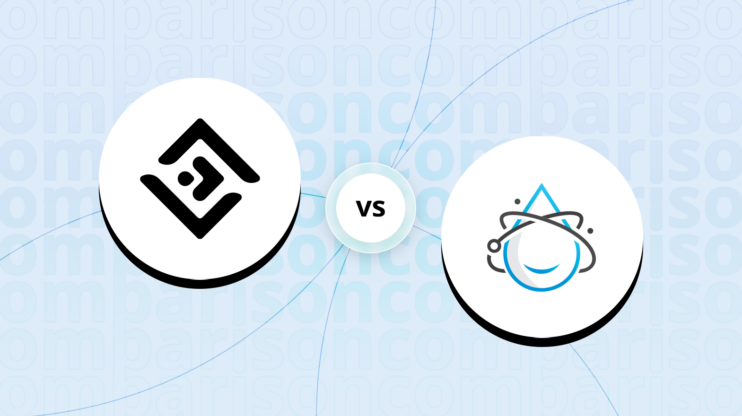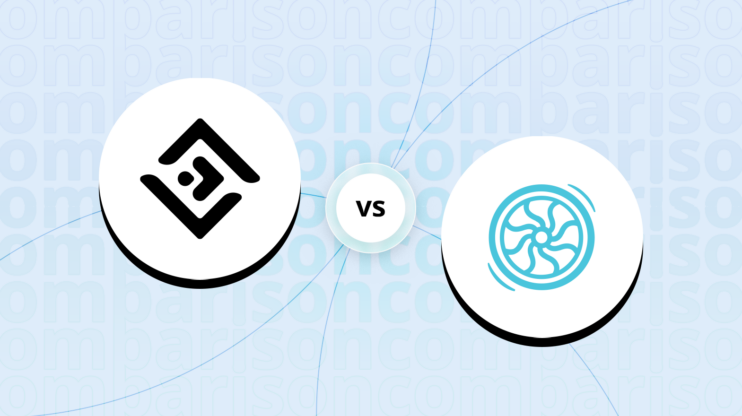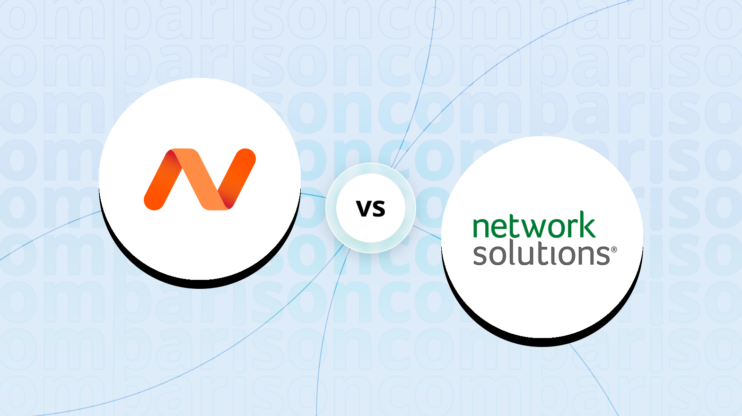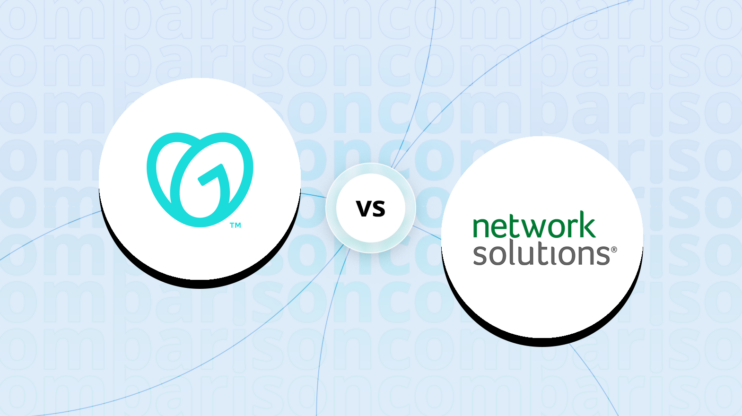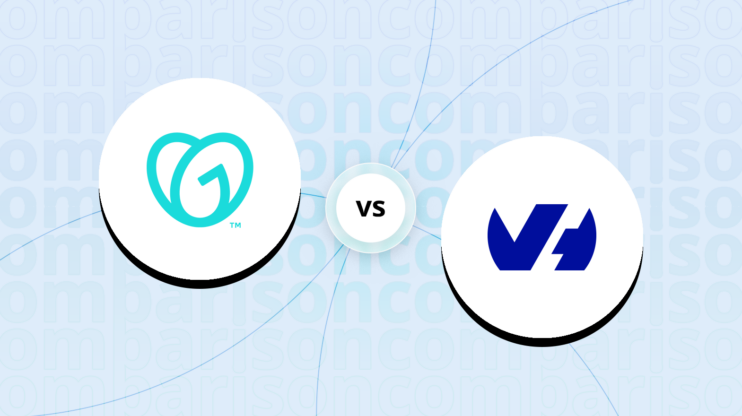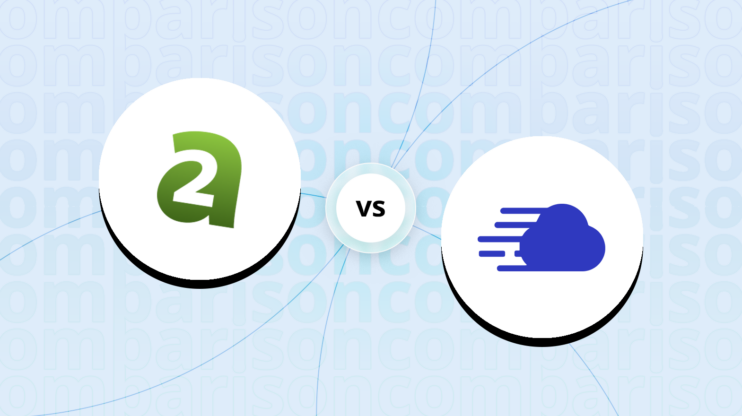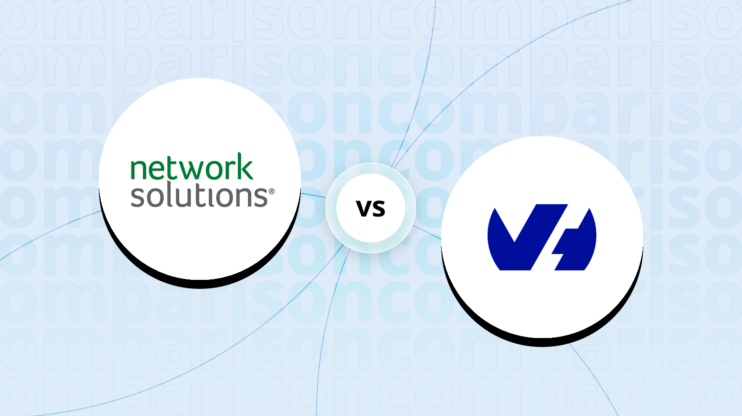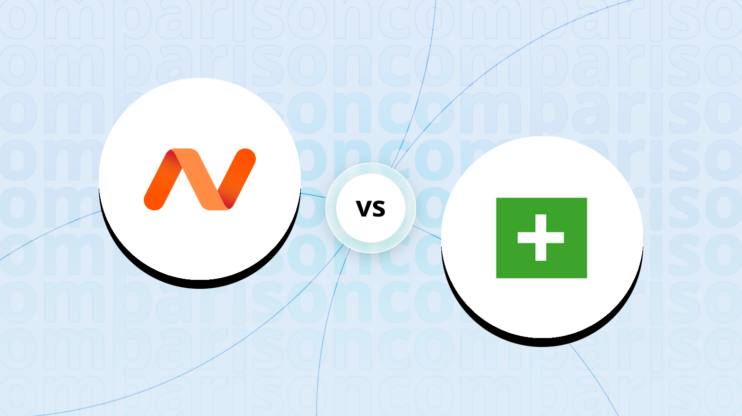Final verdict
Looking over Flywheel vs. Liquid Web, it’s clear why both hosts are so popular. They have both hosted millions of
websites that run on WordPress for decades, building up a loyal customer base.
-
Liquid Web (Overall grade: 8.4)
provides a more versatile and robust hosting service with a wide range of managed options, including VPS and dedicated servers. It shines in high-performance hosting, offering features like autoscaling, multi-server environments, and a comprehensive suite of security measures. Liquid Web’s high availability and proactive monitoring are significant strengths, ensuring reliability for high-traffic and complex hosting needs. However, the platform’s more complex interface and the need for additional support could pose a learning curve for non-technical users. Additionally, email hosting capabilities and certain feature details are less explicit, requiring direct consultation for specific needs.
Flywheel (Overall grade: 8.4)
offers a streamlined and intuitive hosting experience specifically designed for WordPress users. It excels in uptime performance and managed WordPress hosting features like FlyCache, CDN support, and nightly backups. Flywheel is highly regarded for its ease of use, particularly beneficial for agencies and professionals managing multiple WordPress sites, thanks to its collaboration tools and demo sites. However, Flywheel lacks VPS and dedicated hosting options and does not provide email hosting services, which could be a limitation for some users.
 Overall grade:8.4 |
 Overall grade:8.4 |
|
|---|---|---|
| Uptime and Availability | 9.7 | 9.2 |
| Hosting Performance | 8.2 | 7.7 |
| Hosting Security | 9.4 | 9.3 |
| Price | 8.1 | 8.0 |
| Hosting Features | 6.8 | 6.4 |
| Ease Of Setup | 8.9 | 8.7 |
| User Management | 7.8 | 8.3 |
| Customer Support | 8.5 | 9.4 |
| User feedback | 4.4/5 | 4.3/5 |
Hosting types offered
Both platforms provide a variety of hosting types, each designed to meet the different needs of users.
 |
 |
|
|---|---|---|
| Shared hosting | ||
| Cloud hosting | ||
| WordPress hosting | ||
| Ecommerce hosting | ||
| VPS hosting | ||
| Dedicated hosting |
Although both offer a variety of hosting plans tailored to different needs, in
certain cases, one platform may prove to be more suitable.
Detailed comparison
Uptime and availability
Evaluates the average uptime statistics, uptime guarantee and overall availability of the hosting
provider
Score Components:
- Uptime percentage (30%): evaluates the uptime statistics in given period of time
- Uptime guarantee (20%): Assesses if the platform offers an uptime guarantee and
whether the actual uptime matches the promised guarantee. - General performance (25%): Evaluates how fast is the average response time and overall
it’s stability. - Responsiveness (10%): Adaptability to different devices and screen sizes.
- Availability (25%): Reflects the total downtime and number of outages.
 9.7
9.7
 9.2
9.2
🏆 Winner Flywheel: Flywheel offers exceptional uptime and availability, making it the best choice for dependable web hosting.

Flywheel delivers on its promise of a high uptime guarantee at over 99.9%, backed by actual performance showing 100% uptime in a monitored two-week period. Users benefit from an average response time of 371ms, significantly faster than the market average. Additionally, Flywheel provides 24/7/365 support through multiple channels, ensuring any issues are resolved promptly.
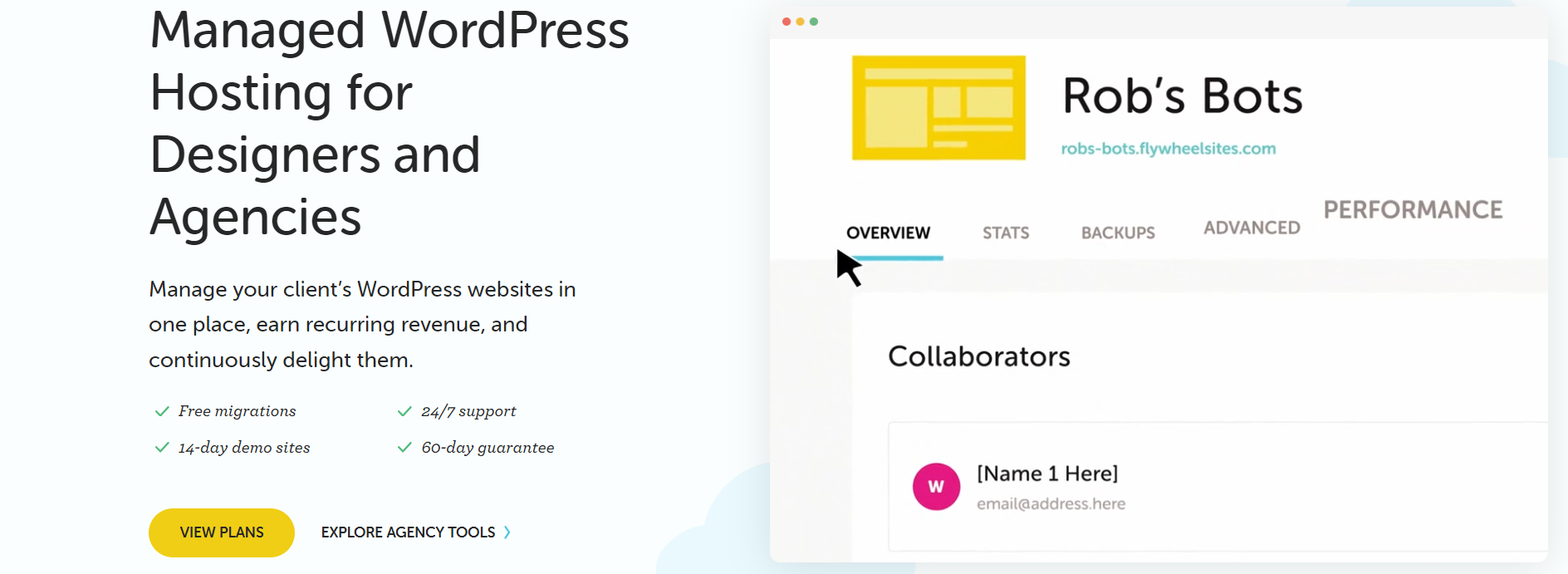
Liquid Web also offers an impressive suite of features, including high availability hosting with multi-server environments and a proactive monitoring system. The service guarantees 100% power and network uptime, supported by a generous credit policy for any downtime. With managed high availability and instant data replication, Liquid Web aims to keep your site online without fail. Nonetheless, Flywheel’s consistent performance and rapid response times give it the edge.
Hosting performance
Score Components:
- Hosting speed (30%): This includes SSD quality, Load times, PageSpeed score ranges,
additional information on website speed, built-in plugins for performance enhancement, available caching
methods, and CPU/RAM options - CDN (20%): Considers whether CDN is available or not, whether it’s free or paid, and
the quality of the CDN service - Available data centers (30%): Evaluates the number of data centers and their locations
globally. - Scalibility (20%): Looks at whether elastic scaling is available, the process required
to scale (manual upgrade vs. automatic scaling), the presence of dedicated servers, and the costs
associated with scaling.
 8.2
8.2
 7.7
7.7
🏆 Winner Flywheel: Flywheel offers superior performance and comprehensive features for WordPress sites.
Both Flywheel and Liquid Web offer high-performing hosting services, but Flywheel edges out with its tailored approach for WordPress performance. Flywheel’s platform uses built-in managed caching and a CDN powered by Fastly, ensuring fast load times without needing plugins. Their Flywheel Cloud Platform provides dedicated resources, which avoids shared server space, further enhancing performance. Liquid Web features a 10 Gbps network and robust processors like AMD EPYC and Intel Xeon, but its strength lies more in its versatility rather than specialized WordPress optimization. Both services offer global data centers and utilize SSD/NVMe storage for excellent speeds.
Website speed
Flywheel’s emphasis on WordPress site performance stands out. Their managed caching, paired with CDN from Fastly, ensures pages load quickly. Flywheel also offers performance insights for continuous improvement. Liquid Web, with its advanced processors and NVMe/SSD storage, provides excellent speed as well, especially on their VPS and dedicated server plans. Yet, Flywheel’s dedicated focus on WordPress-specific optimizations results in slightly better performance for those sites.
Scalability
Flywheel allows custom plan creation tailored to your needs but doesn’t provide dynamic scaling. You can upgrade plans as needed. Liquid Web offers a more scalable solution with features like autoscaling, which adjusts server resources automatically based on user demand. Both provide dedicated servers, but specific pricing details for scaling Flywheel aren’t readily available, whereas Liquid Web includes autoscaling at no extra cost.
Hosting security
and regulatory requirements
Score Components:
- Technical security measures (40%): This includes encryption, firewalls, DDoS
protection, secure configurations, server monitoring, access control and availability of security addons
(e.g Sitelock security). - Operational security measures (30%): Encompasses data privacy, backups and data
redundancy. - Compliance and certifications (20%): Adherence to legal and regulatory requirements
(e.g., GDPR, HIPAA) and possession of certifications (e.g., ISO 27001, SOC 2). - Business and reliability (10%): Factors in the provider’s reputation, uptime
guarantees, and customer support.
 9.4
9.4
 9.3
9.3
🏆 Winner Flywheel: A hosting provider with comprehensive security features and compliance measures.
Both Flywheel and Liquid Web, have notable differences in their approaches to technical and operational security, as well as in their compliance with regulations.
Technical security measures:
Flywheel offers free SSL certificates, PHP 8.1 support, a Fastly WAF, intelligent IP blocking, plugin security alerts, free malware removal, auto-healing technology, and nightly backups. Liquid Web, on the other hand, provides SSL certificates, firewalls, VPNs, DDoS attack protection, web application protection, an F5 AIP intrusion detection system, and data encryption at rest. Both providers ensure security but Flywheel offers some unique features like auto-healing technology and plugin security alerts.
Operational security measures:
Flywheel implements role-based permissions and a federated identity service for simplified user authentication. Liquid Web provides 24/7/365 on-site support, quarterly PCI compliance scans, and compliance assistance. Both offer round-the-clock support but Flywheel adds value by offering free migrations and proactive malware removal by their Happiness Engineers.
Compliance and certifications:
Flywheel meets HIPAA, GDPR, 21 CFR Part 11, GCP, and is SOC 2 audit certified. Liquid Web supports GDPR and HIPAA compliance and provides PCI compliant hosting solutions. It also holds SSAE-22 (SAS70) & Safe Harbor certifications. Both hosting providers cover comprehensive compliance requirements, but Flywheel offers more certifications relevant for different industries.
 |
 |
|
|---|---|---|
SSL certificate |
Free SSL Certificates |
SSL Certificates |
Additional security features |
Fastly WAF, Intelligent IP Blocking, Plugin Security Alerts, Free Malware Removal, Auto-Healing Technology, Nightly Backups |
Firewalls, VPN, DDoS Protection, Web Application Protection, F5 AIP Intrusion Detection System, Data Encryption at Rest |
PHP versions |
PHP 8.1 Ready |
Various PHP Versions |
GDPR compliance |
Yes |
Yes |
HIPAA compliance |
Yes |
Yes |
PCI compliance |
Not specified |
Yes |
Hosting features
Score Components:
- Domains (20%): Assesses the availability of a free domain, domain purchase options, and
pricing - Email (15%): Considers if the provider offers full email hosting, or is reselling
third-party service, and if the email is only transactional or not - Website builder (15%): Checks if website builder is available, and it’s user
friendliness and overall the level of customization allowed. - Staging environment (20%): Determines if a staging environment is available, allowing
for testing changes before going live. - FTP & SFTP accounts (10%): Evaluates if and how easily users can access FTP and
SFTP accounts - Git and SSH access (20%): Assess whether Git is integrated into the hosting service and
if SSH access is provided
 6.8
6.8
 6.4
6.4
🏆 Winner
Flywheel: Comprehensive managed WordPress hosting with a focus on top-tier support and user-friendly workflow tools.
Flywheel and Liquid Web both offer exceptional features tailored to different user needs. Flywheel’s focus on managed WordPress hosting with features like FlyCache, nightly backups, and Auto-Healing Technology makes it user-friendly, especially for those focused on WordPress. Their free site migrations, managed security, and 14-day demo sites cater to users looking for a hassle-free setup and maintenance. Flywheel’s collaboration tools and Blueprint feature further enhance the workflow for developers and agencies. They do not offer email hosting, which could add an extra step for users needing email services.
Liquid Web, on the other hand, offers a broader range of managed hosting options, catering to complex hosting environments and high availability needs. They excel in providing HIPAA or PCI compliant infrastructure, making them an excellent choice for users in need of compliant solutions. Their proactive server management and 24/7/365 support with guarantees on response times emphasize reliability. Liquid Web offers versatile managed VPS and WooCommerce hosting, ensuring high-performance and scalability without compromising on speed or security. While it does not explicitly mention FTP/SFTP and staging environments in the provided details, the managed hosting environment typically includes these features.
 |
 |
|
|---|---|---|
Free domain |
No |
Not mentioned |
Free SSL |
Yes |
Not mentioned |
Email hosting |
No |
Not mentioned |
Website builder |
No |
Not mentioned |
Staging environment |
Yes |
Not mentioned |
FTP & SFTP accounts |
Yes |
Yes |
Git and SSH access |
Yes |
Yes |
Free backup |
Yes |
Not mentioned |
Money back guarantee |
Yes, for certain plans |
Not mentioned |
a location.
As a result in rare cases the features mentioned here can differ from the ones you see on their websites.
Both providers support a range of users from beginners to experts with user-friendly website builders and WordPress staging areas. However, in terms of developer tools, both Flywheel and Liquid Web offer robust options including SSH access, support for multiple programming languages, and Git for version control, thus appealing to developers looking for advanced capabilities.
Email services:
Flywheel does not offer email hosting services and recommends using providers like Google Apps. This means users will have to manage email services separately. Liquid Web’s email hosting is not explicitly detailed in the provided information but is generally included in comprehensive managed hosting packages. For specific email capabilities, including transactional email and campaigns, contacting Liquid Web directly would be advisable.
Price
Score Components:
- Plan value (40%): What each pricing tier offers.
- Transparency and clarity (30%): Clearness of pricing structures.
- Flexibility of plans (20%): Range of options to suit different budgets.
- Hidden costs (10%): Additional expenses not included in the plan.
 8.1
8.1
 8.0
8.0
🏆 Winner Flywheel: Known for its competitive pricing and robust features.
Evaluating the pricing of plans among various hosting providers can be complex due to their differing pricing and renewal strategies. Additionally, certain plans require annual commitments, which adds to the difficulty of making comparisons. The prices listed are based on monthly commitments; plans requiring annual commitments are indicated. Although some providers offer identical plans for WordPress and shared hosting, we have created separate tables for each to enhance clarity.
Flywheel and Liquid Web both offer a variety of hosting plans, catering to different needs and budgets. Flywheel has a clear advantage in offering annual discounts across its plans and includes features such as free migrations and 24/7/365 chat support. On the other hand, Liquid Web has a wider range of plans extending into VPS and dedicated servers, offering higher storage and bandwidth options. Flywheel’s plans are simple and come with inclusive features like SSL certificates and nightly backups, making it a valuable choice for WordPress sites. Liquid Web shines in specialized areas like WooCommerce and VPS hosting but may be more suitable for businesses with specific needs in those areas.
 |
 |
|---|---|
|
Tiny Plan $13/month
1 WordPress site, 5GB storage, 20GB bandwidth, 24/7/365 chat support, free SSL, nightly backups. Value for price:8.5
|
SPARK $21/month
1 site, 15GB storage, 2TB bandwidth, 10 PHP workers per site, free SSL certificates, 24/7 support. Value for price:7.5
|
|
Starter Plan $25/month
1 WordPress site, 10GB storage, 50GB bandwidth, 24/7/365 chat support, free SSL, nightly backups. Value for price:8.0
|
SPARK+ $43/month
3 sites, 25GB storage, 2.5TB bandwidth, 15 PHP workers per site, free SSL certificates, 24/7 support. Value for price:7.0
|
|
Freelance Plan $96/month
Up to 10 sites, 20GB storage, 200GB bandwidth, dedicated account manager, free SSL, nightly backups. Value for price:7.8
|
MAKER $47.85/month for 3 months, then $87/month
5 sites, 40GB storage, 3TB bandwidth, 20 PHP workers per site, free SSL certificates, 24/7 support. Value for price:7.7
|
|
Custom Plan Custom pricing
30+ sites, custom storage, custom bandwidth, free SSL, dedicated account manager. Value for price:N/A
|
ENTERPRISE $492.75/month for 3 months, then $1095/month
250 sites, 800GB storage, 10TB bandwidth, 60 PHP workers per site, 24/7 support. Value for price:8.0
|
 |
 |
|---|---|
|
N/A
N/A Value for price:N/A
|
Starter $21/month
1 store, 30GB storage, 3TB bandwidth, free SSL certificates, 24/7 support. Value for price:7.2
|
|
N/A
N/A Value for price:N/A
|
Starter+ $43/month
2 stores, 45GB storage, 4TB bandwidth, free SSL certificates, 24/7 support. Value for price:7.4
|
|
N/A
N/A Value for price:N/A
|
Merchant $73.80/month for 3 months, then $164.00/month
5 stores, 100GB storage, 5TB bandwidth, free SSL certificates, 24/7 support. Value for price:7.6
|
|
N/A
N/A Value for price:N/A
|
Enterprise $492.75/month for 3 months, then $1095/month
30 stores, 800GB storage, 10TB bandwidth, free SSL certificates, 24/7 support. Value for price:8.0
|
 |
 |
|---|---|
|
Agency Plan $242/month
Up to 30 sites, 50GB storage, 500GB bandwidth, dedicated account manager, free SSL, nightly backups. Value for price:8.0
|
Essential $20/month
1 site, 40GB SSD storage, 10TB bandwidth, DDoS protection, 24/7 support, Root Access. Value for price:6.9
|
|
Custom Plan Custom pricing
30+ sites, custom storage, custom bandwidth, free SSL, dedicated account manager. Value for price:N/A
|
Advanced $30/month
1 site, 100GB SSD storage, 10TB bandwidth, DDoS protection, 24/7 support, Root Access. Value for price:7.0
|
As a result in rare cases the prices displayed here can differ from the ones you see on their websites.
Enterprise plans
Flywheel’s Custom Plan offers exclusive benefits tailored to high-traffic sites, including custom storage and bandwidth, and dedicated account management. Liquid Web’s ENTERPRISE plans come in both WordPress and WooCommerce variants, offering scalable options like up to 60 PHP workers and significant storage. Both providers ensure 24/7 support, but Liquid Web extends its service into specific realms like managed VPS and cloud dedicated servers, adding versatility and depth. Flywheel focuses on providing all-around care for large WordPress sites with guaranteed customer support.
Ease of setup
platform.
Score Components:
- Site migration (25%): Assesses whether the provider offers tools for site migration,
either automated or manual, and whether these services are free or require a fee. - Admin panel usability (35%): Evaluates the type of admin panel provided, such as the
standard cPanel or a custom solution, focusing on its accessibility and user-friendliness for both
technical and non-technical users. - Setup features (20%): Examines the availability and ease of use of various setup
features, including FTP accounts, file managers, email account setup, PHPMyAdmin, and easy CDN
configuration. - Help center quality (20%): Measures the quality and accessibility of the provider’s
help center resources, including articles and tutorials.
 8.9
8.9
 8.7
8.7
🏆 Winner Flywheel: Flywheel offers a streamlined and straightforward WordPress hosting experience.
Flywheel provides a custom admin panel tailored to WordPress users, which is designed to be intuitive for both technical and non-technical users. The layout is clean and organized, making it easy to access different functionalities such as site management, billing, and performance analytics. Additionally, features like Blueprints and site cloning enhance workflow efficiency, allowing users to manage multiple sites with ease. The staging site feature is particularly useful for testing changes without affecting the live site.
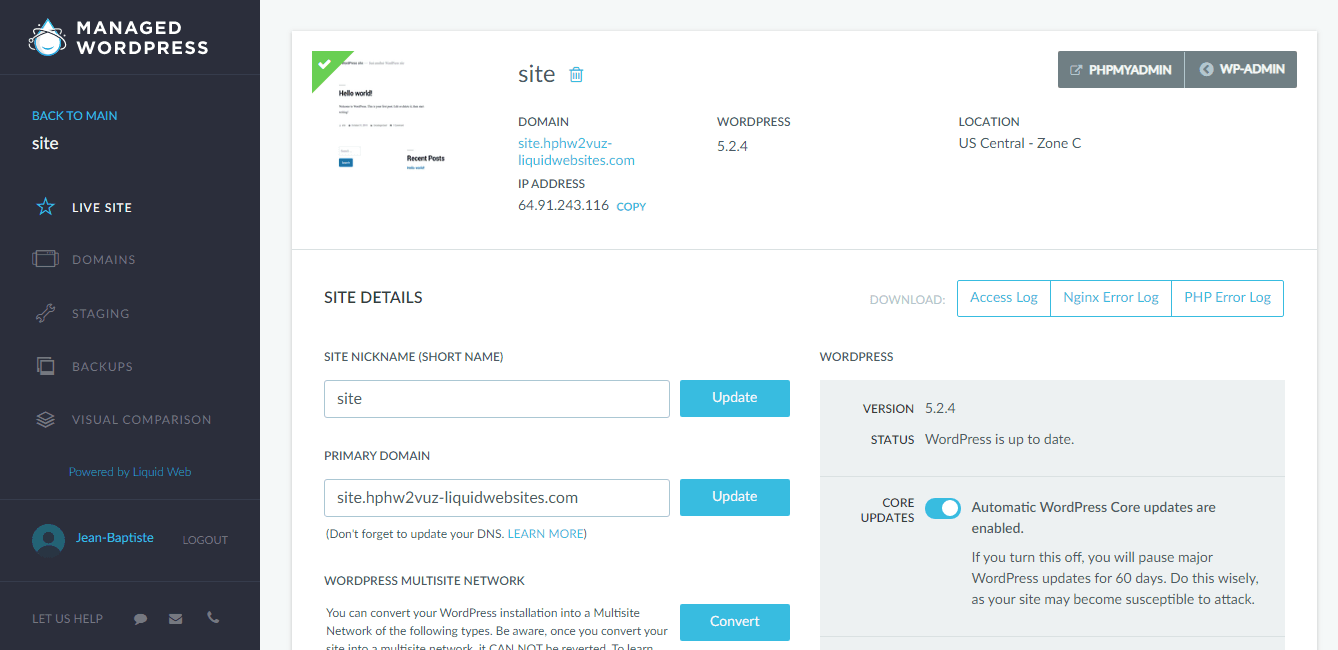
Liquid Web, on the other hand, offers a more traditional setup with a standard cPanel for managing hosting environments. This cPanel is familiar to many users, especially those with previous hosting experience, but it might be slightly overwhelming for non-technical users. Liquid Web’s admin panel is robust with a wide range of functionalities, but its complexity might require a steeper learning curve. The inclusion of proactive management services, however, somewhat mitigates this complexity by offering users additional support in managing their hosting environment.
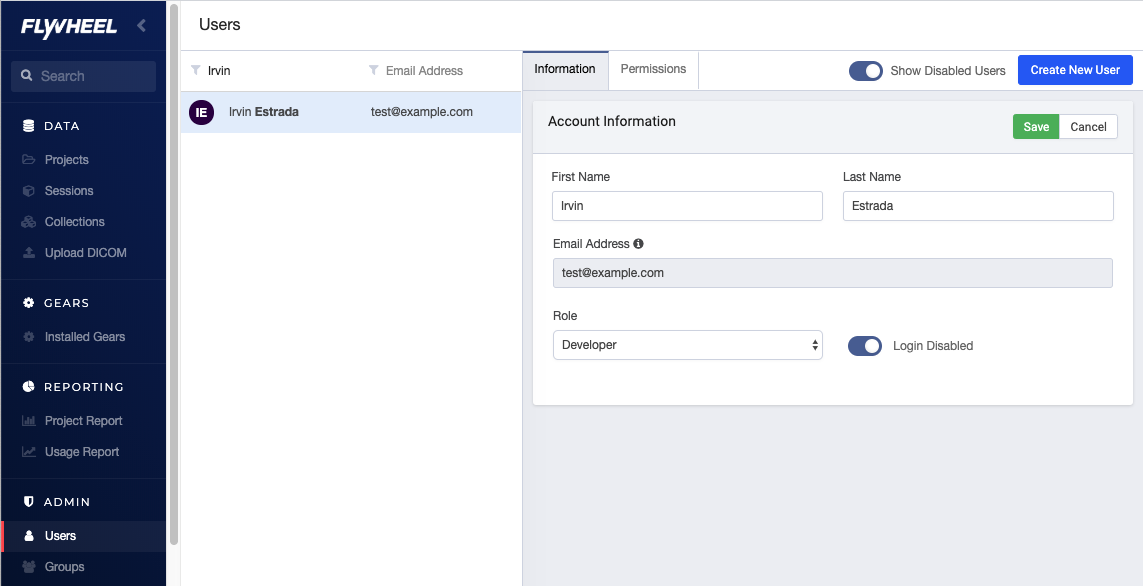
Both Flywheel and Liquid Web provide robust migration tools, but Flywheel takes the lead by offering free migrations for all sites. Flywheel’s migration process is streamlined and user-friendly, with a dedicated migration dashboard that allows users to submit, prioritize, and monitor the progress of their site migrations. Liquid Web also provides assistance with site migration, but the extent of this assistance and its cost are not as clearly outlined as Flywheel’s offering. Liquid Web’s approach seems more individualized, focusing on helping users migrate their sites, stores, or applications, which might come with additional costs depending on the complexity.
The platforms provide extensive knowledge bases filled with guides, how-to articles, and instructional content. Flywheel offers comprehensive help documentation and 24/7/365 chat support, with additional phone support available during business hours. Their help center also includes resources such as a blog, ebooks, videos, and case studies. Liquid Web also provides an extensive knowledge base with articles, tutorials, and resources, and guarantees a 59-second initial response for phone and chat support, as well as a 59-minute initial response for helpdesk support. Both hosting providers have substantial help centers to assist users with their hosting needs effectively.
User management
accessibility.
Score Components:
- Role customization (40%): Flexibility in creating and defining user roles and
permissions. - Ease of management (30%): User interface and tools for managing users.
- Access control (20%): Effectiveness of access control measures for different user
levels. - Scalability (10%): Ability to manage a growing number of users efficiently.
 7.8
7.8
 8.3
8.3
🏆 Winner Liquid Web: Exceptional user role flexibility and management capabilities.
Flywheel offers a collaborative environment where collaborators have significant access, such as site management, SFTP, and database management, but are restricted from billing, site deletion, and site reset. Liquid Web, through Plesk, provides four default user roles—Administrator, Webmaster, Application User, and Accountant. Plesk allows for the creation of custom user roles, offering remarkable flexibility in defining permissions. While Flywheel provides robust collaborator functionalities, Liquid Web shines by permitting the creation and customization of user roles, making it a more adaptable choice for diverse permission needs.
Flywheel’s user interface focuses on simplicity, with an intuitive dashboard that facilitates collaborator addition and removal through straightforward actions. Conversely, Liquid Web’s Plesk interface provides an array of management tools with distinct views—Service Provider and Power User—each offering tailored functionalities for different admin needs. The “Create User Role” feature in Plesk adds depth to its user management, making it more versatile for intricate setups. While both platforms emphasize ease of use, Liquid Web edges out with its comprehensive tools and customizable roles.
In terms of access control efficiency, Flywheel offers seamless management via its dashboard, though it introduces limitations on critical actions like billing and site deletion for collaborators. Liquid Web’s Plesk stands out with its customizable roles and efficient role assignment, which scales well with an increasing user base. The “Additional Administrator Accounts” feature provides added flexibility and ensures that growing teams can be managed efficiently. Liquid Web’s approach to detailed role customization allows for more granular access control, aligning well with the demands of larger or more complex operations.
Flywheel User Roles Table
| Role | Description | Access Highlights |
|---|---|---|
| Collaborator | Full site access with restrictions on billing. | Can manage site settings, add or remove collaborators, access SFTP and database, but cannot manage billing or delete/reset site. |
Liquid Web User Roles Table
| Role | Description | Access Highlights |
|---|---|---|
| Administrator | Full access to Plesk and server management. | Manage all server and subscription settings, create new users. |
| Webmaster | Manage most subscription aspects except user creation. | Configure DNS, mail, FTP services, create new sites. |
| Application User | Limited access for specific application management. | Restricted permissions tailored to application usage. |
| Accountant | View subscription details without modifying settings. | Access billing information, cannot modify any subscription settings. |
Customer support
hosting provider.
Score Components:
- Support communication channels (30%): Measures the variety of customer support types
provided (live chat, chatbot, email, phone, etc.) - Availability (20%): Assesses the availability hours for each channel, including 24/7
support options. - Technical support quality (30%): Assesses whether the provider offers comprehensive
technical support, including hardware upgrades (e.g., HDD to SSD), software installations, and web
server configuration changes. - Enterprise support (20%): Checks if there are dedicated or priority support services
for enterprise-level customers.
 8.5
8.5
 9.4
9.4
🏆 Winner Liquidweb: Providing unparalleled customer support around the clock.
 |
 |
|
|---|---|---|
| Phone support | ||
| Live chat support | ||
| Chatbot | ||
| Email/ticket support | ||
| Enterprise support (dedicated agent, priority support) |
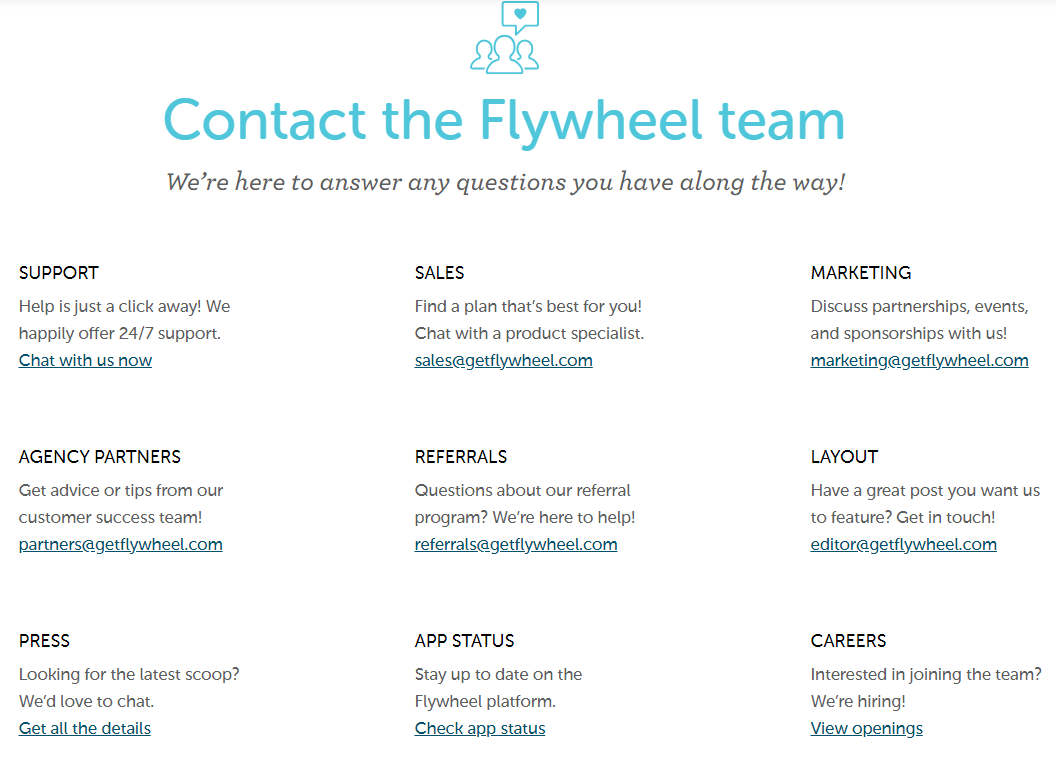
Flywheel offers a variety of customer support options including 24/7 chat, phone support during business hours, and email/ticket support. They feature a Migration Dashboard for streamlined site transfers and even provide dedicated account managers for personalized assistance. Customers appreciate Flywheel’s extended support availability and performance insights through monthly reports.
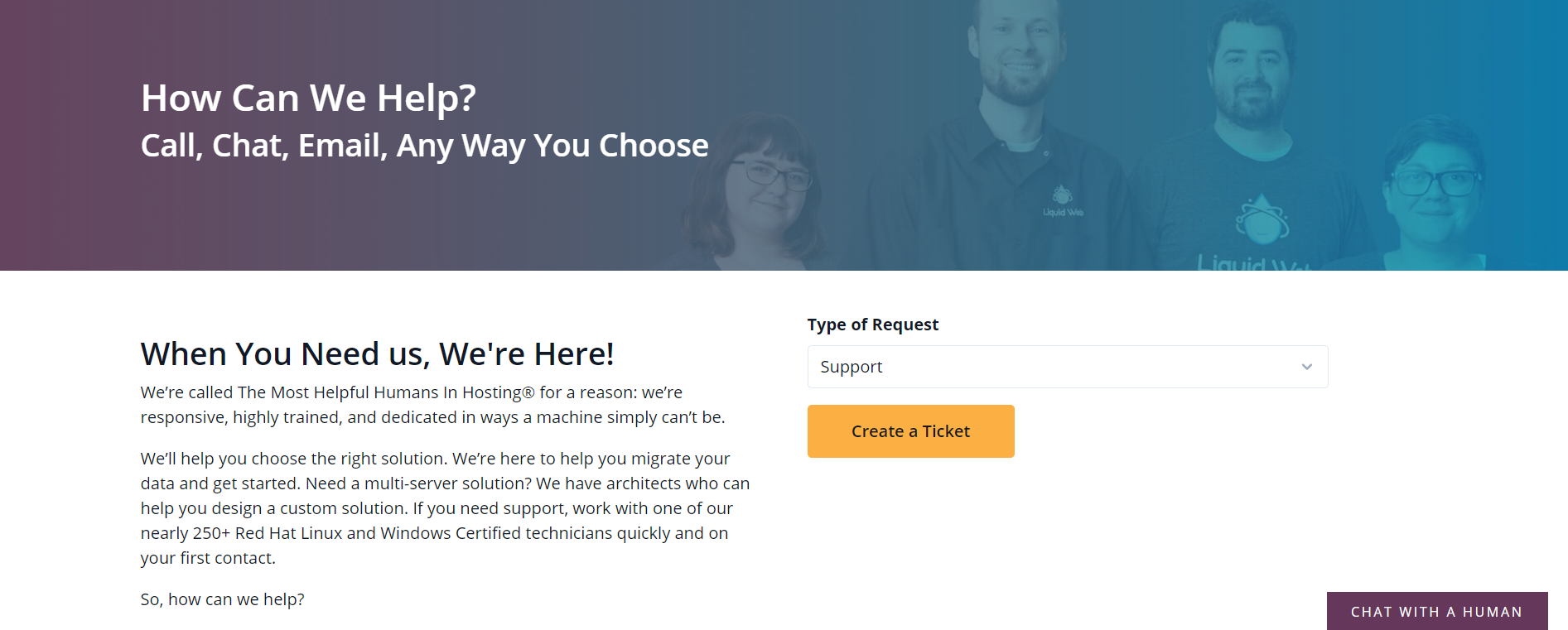
Liquidweb excels in customer service with their Heroic Support® teams available 24/7 via phone, chat, and email. Their support response time guarantees set them apart, offering 59-second initial responses on phone and chat, and 59-minute email responses. They also provide proactive monitoring and custom solutions, reflected in their high customer satisfaction score.
User feedback
Flywheel is highly regarded for its intuitive user interface, efficient WordPress management, and reliable speed and performance. Customers appreciate the ease of site migration, robust support, and included features like SSL and backups. However, some users highlight concerns over recent pricing changes, slower customer service response times, and issues with email limits and staging environments. Despite a few drawbacks, Flywheel is praised for its agency-oriented focus, making it a strong choice for professionals managing multiple client websites.
Customer feedback for this hosting provider is mixed, with significant polarization in user experiences. While some have praised the company for its reliable uptime, exceptional support, and proactive monitoring, others have experienced severe dissatisfaction due to frequent downtimes, unresponsive customer service, and unethical billing practices. Long-term customers, in particular, have noted a sharp decline in service quality and support efficiency, attributing it to recent management changes. Despite positive reviews highlighting excellent technical support and overall reliability, a growing number of users advise against using this provider due to these negative aspects.
FAQ
Which platform is better suited for hosting WordPress websites?
Flywheel is better suited for hosting WordPress websites due to its specialized features like FlyCache, CDN support, nightly backups, and a user-friendly interface tailored for WordPress. Liquid Web also offers managed WordPress hosting but excels more in versatility and scalability for a broader range of hosting needs. Overall, Flywheel’s focus on WordPress optimization gives it a slight edge for WordPress-specific hosting.
Which hosting service offers better security features?
Flywheel provides robust security features including free SSL certificates, PHP 8.1 support, Fastly WAF, intelligent IP blocking, plugin security alerts, free malware removal, auto-healing technology, and nightly backups. Liquid Web offers strong security measures as well, such as SSL certificates, firewalls, VPNs, DDoS protection, a web application protection system, an F5 AIP intrusion detection system, and data encryption at rest. Both platforms offer comprehensive security features, but Flywheel’s unique features like auto-healing technology and plugin security alerts give it an edge.
Which platform offers better customer support?
Flywheel offers 24/7 chat support, phone support during business hours, and email/ticket support, with dedicated account managers for personalized assistance. Liquid Web provides 24/7 Phone, chat, and email support with impressive response time guarantees, including 59-second initial responses for phone and chat, and 59-minute responses for email. Liquid Web’s proactive monitoring and custom solutions, along with their Heroic Support® teams, set them apart, making them a better choice for customer support.
Which hosting service offers more scalability options for growing websites?
Flywheel allows custom plan creation tailored to specific needs but does not provide dynamic scaling, though you can upgrade plans as needed. Liquid Web offers more scalable solutions with features like autoscaling, which automatically adjust server resources based on user demand. Both platforms provide dedicated servers, but Liquid Web’s automatic scaling and broader range of options make it more scalable for growing websites.
How do the providers handle email hosting and what features are included?
Flywheel does not offer email hosting services and recommends using third-party providers like Google Apps, meaning users will need to manage email services separately. Liquid Web’s email hosting details are not explicitly included in the provided information but generally come as part of their comprehensive managed hosting packages. For specific email capabilities, contacting Liquid Web directly would be advisable.
The making of this blog
We followed a clear, step-by-step process to write and research this article.









